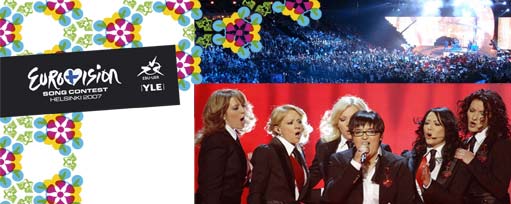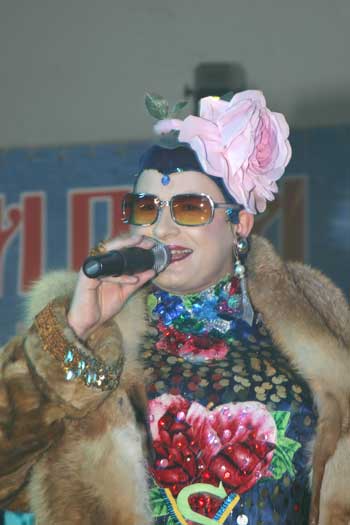 |
The Future Is Camp!
|
|
|
The Eurovision Song Contest was on last week. Ireland came last. We got only five points, which arrived as a single shipment from Albania, of all places. Marty Whelan couldn't understand it. The competition was won by a very butch lady in a tuxedo from the Republic of Serbia, which didn't even exist when Ireland ruled the competition during Johnny Logan's glory days. Ireland had gone to a lot of trouble of selecting a very accomplished group of traditional musicians called 'Dervish' and had a good song written by a good songwriter. On the night we had it all going on - a pretty girl in traditional maiden's dress, all smiles, teeth and hair; gathered around her a collection of non-threatening blokes sawing away for all they were worth on fiddles as they happily pranced around the stage after the traditional maiden. What's not to like? Why didn't we win? The sad fact is that the world has moved on. Back in the 1970s and 1980s it was a sign of national pride and accomplishment to see Coleman Pearce, conductor of the RTE Symphony Orchestra, stride onstage in Luxembourg or wherever and command the orchestra with his own Irish baton as our chosen singer showcased the national song. 
It was a song contest, you see - not about the singer or the performance. It was a cultural showing off competition, a chance to show year after year that French songs were superior to German songs. Everybody sang in their national language, which added a very exotic touch to proceedings. This was heightened by having the votes telephoned in down crackling telephone lines and the votes being added up by some boffin who had been shoe-horned into a dickie bow it for the occasion and was in control of 'the computer' (presumably the only one around for miles and which had taken a month to commission prior to the event). The cold-war glamour was tangible when a distant distorted voice would proclaim in heavily accented English "Hello? This is Helsinki calling!" and every utterance would be repeated in French as the official language of cultured Europe, where cultured people were having cultured dinner parties to celebrate the continued supremacy of the French song (nobody had really forgiven the Germans for the war, but you wouldn't say that to there faces, Darling, they're so co-operative about the farm budget). But we no longer live in cold war times. Modern communication capabilities mean we now have widescreen high definition views of the occasion, rather than crackly telephone lines. Thanks to budget airlines flying for half-nothing to someplace you've never heard of, you're more likely to have spent a city break in Talinn than Templemore. We also have a lot more countries knocking around. This year's winner, the Republic of Serbia (Republika Srbija) used to be part of Yugoslavia before that country imploded, and is not to be confused with the Serb Republic (Republika Srpska), which forms part of the Confederation of Bosnia & Herzogovina and was represented under that flag. It's is no longer dominated by the six founding members of the European communities, the axis of Europe has shifted eastwards. Not only were a panoply of former Warsaw Pact members taking place, but there were nine competitors which were formerly part of the USSR itself (Armenia, Belarus, Estonia, Georgia, Latvia, Lithuania, Moldova, Ukraine and mother Russia herself) - most of which made it to the finals. It's no wonder that the judging section now includes a large map and a pointing hand to show precisely where the voting country actually lies in the scheme of things. There's a massive influx of bright enthusiastic new countries which see it as a sign of national pride and accomplishment for their nation to be represented by a silver clad cross dresser wearing a big pointy star on his/her head, accompanied by male dancers in unfeasibly tight silver lame hot-pants while singing a Hi-NRG disco number in German. Even more so, if the same cross dresser (Ukraine's Verka Serduchka ) runs a close second in the competition. 
The stuffed-shirts in the club drawing rooms of Brussels may feel that the Eurovision has traded its high culture and dignity for crass populism, but you have to admit, it is astonishingly popular and that has to count for something. In truth, there was never any high culture attached. The competition was a way for the European Broadcasting Union to showcase its pan-national linkages. It was a way for the host country to show off what a desirable location it was. It was a way for the winning country to feel smug and superior. It was a way for countries emerging from dictatorship or economic insularism to scrabble for respectability and for their citizens to blink in wonder at the glitz and glamour of the European ideal. This hasn't really changed - it has just become very, very successful. Rather than the old days when Portugal and Ireland were the local urchins, it's now Balkan and former-Soviet republics knocking on the door and looking to join the party. In fact, they've jammed the party - hundreds of fresh-faced young presenters with blonde highlights, an overabundance of hair gel, and a slightly askew fashion sense whose unpronounceable names in foreign alphabets make the founding fathers feel like strangers in their own house. Which in a sense they have become, but it's a bigger house now. While the Cold War has been unexpectedly won without a single tank crossing the Elbe, there have been some casualties along the way. Traditional native dress is one. Male contestants instead dress for a Ricky Martin look-alike competition, if not in full drag, while women dress like strippers or their customers, depending on orientation. This has provoked a mixed reaction. The Italians have withdrawn from the competition in a huff, while the Germans get that it has become an iconic gay event and have handed it over to the camp wing of light entertainment to play with. The French are still hanging in there, bravely mounting a siege defence for the sake of la langue, not noticing that this particular battle is already lost. So many new countries with so many different languages forced the adoption of a common language not by cultural fiat but simply in order to order food & drink in resaurants. The only languages sufficiently common to all were English and Russian. Historical considerations aside, it wasn't going to be Russian. The new Europe has started to get by in low quality, highly accented English not because it's the language of Shakespeare or because it's the language of George Bush. It's because it's the language of the Internet. Even HTML, the language describing the language on the page to the web browser is written in English. If the Alliance Française had infiltrated the ASCII and invested in Moldova rather than Montreal, maybe history would have taken a different turn. Welcome to the New Europe. It's young, bright-eyed and enthusiastic (and not a little camp). It has terrible fashion sense and appalling musical taste. But it's big, friendly and it works, after a fashion. |
